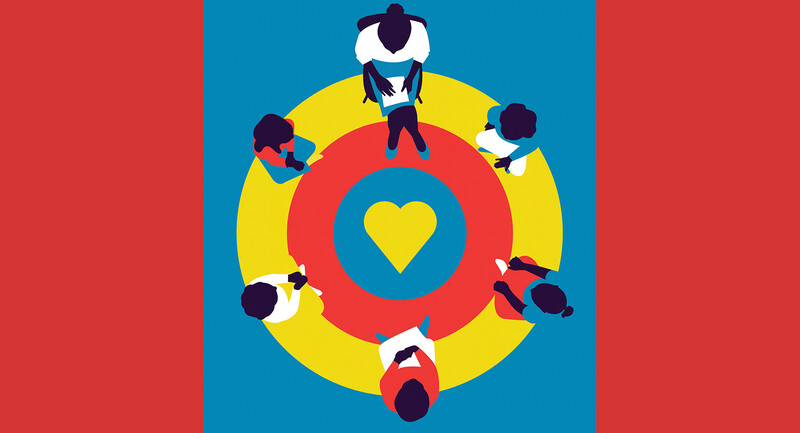I was once shadowing a principal when a teacher approached us, steaming that a freshman student in his class had been disrespectful. The teacher tried to redirect the student and get him to work on a class assignment, but the student became increasingly agitated and caused a scene. When the teacher told the student he wanted him to get on task, he responded, "Do you think I care about what you want? Do you think anybody in this class ever cares what you think?" The teacher then stated to the principal that he was tired of this student's disrespect and lack of effort. It would be better, he believed, if the student was just removed from the class since he wasn't passing and wasn't likely going to be able to recover.
The principal immediately followed up and asked security personnel to bring the student to her office. When the student arrived, he said he knew why he was summoned, and his armor was on full display. His arms were folded, his jaw was clenched, and he was argumentative. He admitted to his behavior but shared that the teacher had raised his voice and made a sarcastic comment about his grade. He disclosed that he didn't feel like working on the assignment because he was going through some personal problems.
The principal thanked him for sharing and asked if he wanted to talk about what was going on. He sat quietly for a moment, head down. "I just don't think I can do this," he said. "School isn't for me. I'm just not any good at it. I just want to quit."
As I sat there, I couldn't help but think about all the times I had heard students share similar thoughts with me as a school leader. This principal listened intently, offered words of encouragement, and was able to eventually get the student to a good place to discuss the classroom incident. The student admitted that he had been disrespectful to the teacher and accepted his consequence.
The principal then asked the student how he wanted to repair things with the teacher. The student said he didn't know, but he wasn't going to apologize. The principal said, "What if you considered going to the teacher and saying this?"
I want you to know that I realize how out of line and disrespectful I was to you. I am dealing with some personal stuff and let it get to me too much. I would like to come back to class, and I can promise you nothing like that will happen again.
The principal looked right at him and said, "Do you know what you wouldn't be saying?" The young man answered, "I'm sorry."
Too many young (and older) people don't have the skills to apologize, in part, because no one has ever modeled for them how to do so. By offering a path forward that didn't require a direct apology, the principal allowed the student to develop an emotional vocabulary that was comfortable for him. While he didn't apologize outright, he did register with the teacher that he was struggling personally and took ownership for his behavior.
Forgiveness Tip
Learning how to accept an apology is integral to the process of forgiveness: It gets the two parties talking to one another and begins to heal and repair the damaged relationship.
Making It Right
Shortly after that exchange, the principal met with the teacher once more and asked if he was aware that he'd embarrassed the student. The teacher admitted he was frustrated and did make a comment about the student's grade, though he didn't intend to offend him. The principal found herself asking the teacher the same question that she had posed to the student: How do you intend to repair this situation? In this case, the teacher agreed to meet with the student, apologize, and work to rebuild their relationship.
If we as educators aspire to maintain positive, healthy, and loving relationships with students, we must acknowledge when we too have behaved in hurtful ways and then try to make it right. We also need to assess our role in escalating or de-escalating situations. When students are argumentative, do we become contentious or display a calming presence? When students yell or swear, is our response to yell louder or do we provide empathy and reassurance? We have all encountered people who have to be right and have the last word (a brutal combination, by the way). We don't want to be those people. When we validate a student's feelings and help them find a voice to express those feelings—as the leader I shadowed did—we are offering that student the chance to cultivate deeper social-emotional skills and close the gap between the intent of their words and actions and the resulting impact on others.
This requires the adults in schools to evaluate their own emotional maturity and interpersonal skill set to ensure they engage in conversations and interactions with students and colleagues that are rooted in kindness and generosity of heart. When adults make assumptions or take things personally, the ability to maintain social and emotional skills that focus on the well-being of others is diminished. This negatively impacts our relationships, not only with students, but also with colleagues.
Responding with Reason
If we are going to make judgments about students or colleagues, let's vow to make them charitable in nature. This approach will enable us to keep an open mind about—and a generous heart toward—others, to provide care and extend grace. The following tips can help us learn to respond, not react in the heat of the moment.
Listen to the emotion more than the words: When a student is yelling, crying, or saying inappropriate things, focus on the emotion rather than their words. Instead of addressing the behavior in that moment, help the student concentrate on their breathing to bring their emotions back into balance. Too often we listen only to the words for the purpose of placing blame or fault rather than responding to the hurt and pain.
Listen to understand: Most of us are wired to listen to respond, rather than to truly understand the perspective of others. Remove the point-counterpoint tone that contentious conversations can take, especially when people are hurting. Ask clarifying questions instead of making pronouncements. Acknowledge and appreciate the other person's perspective even when you disagree. Listening to understand will yield a quicker and healthier resolution to the matter.
Offer a safe space: Be the type of educator/friend/parent/partner who creates conditions for others to candidly talk through things without feeling judged. This can include providing a private space, a listening heart, and a promise to honor confidentiality. When people can talk plainly without filtering their language, they often feel safer about opening up. That candor can more authentically illuminate how the other person is processing information and experiences.
Model how to apologize: There are three key ingredients to an effective apology (saying "I'm sorry if you were offended" isn't one of them). Issuing an apology requires:
Verbalizing ownership and responsibility for the situation (a simple "I'm sorry" can go a long way).
Acknowledging the hurt caused and the impact it had on the other person.
A commitment to do better moving forward.
Say, for example, you repeated something a colleague shared with you in confidence, and it got back to him. A healthy apology might sound like this:
I am sorry I violated your confidence by repeating what you told me in private. It was inappropriate and insensitive of me, and I hurt you and hurt the trusting relationship we have with one another. I have learned from this and recognize that sometimes I like to feel important by letting people know that I am a person others come to. It was wrong of me, and I will not let it happen again. I am sorry.
This apology is direct and sincere. Rather than blaming others, it assumes responsibility and signals a commitment to do better in the future. Imagine if educators were willing and able to issue this type of apology to students when we've been reactionary, sarcastic, or dismissive.
Offer a path forward through forgiveness: More often than not, when someone says, "I'm sorry," the injured party usually responds with "It's OK." Was it OK that the colleague repeated private information when he was asked not to? No. Is it OK when a student spreads a rumor about another student? No. So why is our automatic response usually, "It's OK?" Because people don't generally know how to accept an apology. Learning this skill is integral to the process of forgiveness: It gets the two parties talking to one another and begins to heal and repair the damaged relationship.
Imagine if the injured party instead responded in the following way:
I appreciate the apology and I accept it. I have been very hurt by this because I felt I could trust you. I feel betrayed and I don't want to feel this way. I accept your apology and ask that you please not violate my trust again. I value you and our friendship and hopefully we can both learn from this, so we are better friends to one another going forward.
The standard response, "It's OK," dismisses the seriousness of an offense and lessens the likelihood of changed behavior. By hearing how the injured party felt, the offender has better insight into the extent of the hurt caused.
Embrace the gift of forgiveness: When we genuinely accept an apology from someone, we are in fact forgiving them. Recognize that apologizing isn't easy—it requires taking ownership for our wrongdoing and can even be an admission of guilt. Saying "I'm sorry" is difficult for even the most mature adult to do, so be mindful of this when a student is seeking your forgiveness. Be careful not to judge the sincerity of an apology if it's not delivered "just right." People can express remorse without verbalizing an actual "I'm sorry." When we truly know our students and colleagues, we can assess regret and extend forgiveness regardless of the words spoken.
Give students a fresh start: When a student makes a mistake, don't leave them feeling like they will be forever judged. It is imperative to articulate that no one is going to hold the incident over the student's head—that they have a fresh start. Encourage them to file the matter under life "experience." Emphasize your point by asking, "Do you believe me when I say this to you?" and ensure that you follow through.
Be careful not to judge the sincerity of an apology if it's not delivered 'just right.'
Handle with Care
Educators who commit to handling students and colleagues with care nurture a vibrant school culture rooted in genuine experiences. Given the amount of time our students and staff spend in classrooms (whether in-person or virtual) and on our courts, fields, stages, and playgrounds, don't we want all students, teachers, and coaches to walk away from their experience in our schools feeling grateful for the opportunity and sad that it has come to an end? Unfortunately, far too often, students and staff are more thankful that the experience is over. How can we prevent this? Much like first responders, we need to be alert, accessible, and attentive to those who need to be handled with care.
There may be times when we need to be "handled with care" because of personal difficulties and challenges in our own lives. Imagine, if, during times of difficulty or pain, we attached to ourselves a label marked "Handle with Care." It would alert everyone we encounter that they should proceed with sensitivity when interacting with us. One is left to wonder how many students are walking through our hallways feeling invisible, lonely, lost, and in some cases, hopeless. Now imagine the level of care they would have received if they had a "Handle with Care" sticker attached to their backs. The trajectory of their school experience would certainly be different.
If we knew when and who needed to be handled with care, we would be better able to provide adequate support. However, do we need visible evidence that someone is hurting to champion for them? Do we need a special notification to prompt us to expect excellence from ourselves and others? To apologize and forgive and model these skills to the best of our ability? We can carry the banner for our schools when we assume the best about others and invest in relationships with students, staff, and colleagues. As merchants of hope, we must continue to believe in every student and every adult, every day, and be willing to do whatever it takes to inspire them to be more and do more than they ever thought possible.
As you move forward in your journey, remain committed to extending grace, empathy, and forgiveness to meet the needs of all members of the school community. Handle them with care today, tomorrow, and always.
Reflect & Discuss
What steps could you take to model a more charitable understanding in your interactions with students or colleagues?
Have you ever held an incident over a student's head? What did that look like and what could you have done differently?









